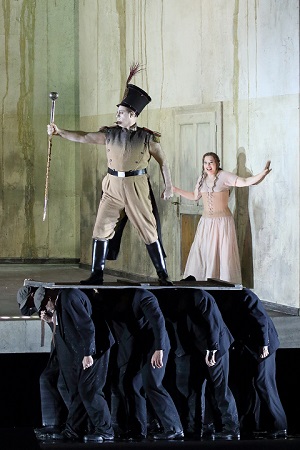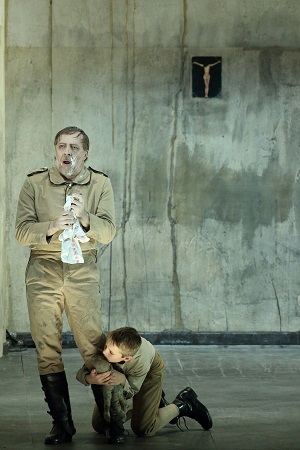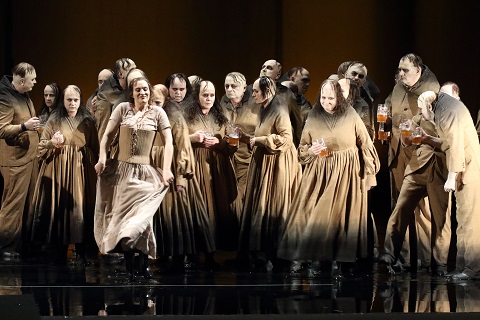Recently in Reviews
English Touring Opera are delighted to announce a season of lyric monodramas to tour nationally from October to December. The season features music for solo singer and piano by Argento, Britten, Tippett and Shostakovich with a bold and inventive approach to making opera during social distancing.
This tenth of ten Live from London concerts was in fact a recorded live performance from California. It was no less enjoyable for that, and it was also uplifting to learn that this wasn’t in fact the ‘last’ LfL event that we will be able to enjoy, courtesy of VOCES8 and their fellow vocal ensembles (more below …).
Ever since Wigmore Hall announced their superb series of autumn concerts, all streamed live and available free of charge, I’d been looking forward to this song recital by Ian Bostridge and Imogen Cooper.
The Sixteen continues its exploration of Henry Purcell’s Welcome Songs for Charles II. As with Robert King’s pioneering Purcell series begun over thirty years ago for Hyperion, Harry Christophers is recording two Welcome Songs per disc.
Although Stile Antico’s programme article for their Live from London recital introduced their selection from the many treasures of the English Renaissance in the context of the theological debates and upheavals of the Tudor and Elizabethan years, their performance was more evocative of private chamber music than of public liturgy.
In February this year, Albanian soprano Ermonela Jaho made a highly lauded debut recital at Wigmore Hall - a concert which both celebrated Opera Rara’s 50th anniversary and honoured the career of the Italian soprano Rosina Storchio (1872-1945), the star of verismo who created the title roles in Leoncavallo’s La bohème and Zazà, Mascagni’s Lodoletta and Puccini’s Madama Butterfly.
Evidently, face masks don’t stifle appreciative “Bravo!”s. And, reducing audience numbers doesn’t lower the volume of such acclamations. For, the audience at Wigmore Hall gave soprano Elizabeth Llewellyn and pianist Simon Lepper a greatly deserved warm reception and hearty response following this lunchtime recital of late-Romantic song.
Collapsology. Or, perhaps we should use the French word ‘Collapsologie’ because this is a transdisciplinary idea pretty much advocated by a series of French theorists - and apparently, mostly French theorists. It in essence focuses on the imminent collapse of modern society and all its layers - a series of escalating crises on a global scale: environmental, economic, geopolitical, governmental; the list is extensive.
For this week’s Live from London vocal recital we moved from the home of VOCES8, St Anne and St Agnes in the City of London, to Kings Place, where The Sixteen - who have been associate artists at the venue for some time - presented a programme of music and words bound together by the theme of ‘reflection’.
'Such is your divine Disposation that both you excellently understand, and royally entertaine the Exercise of Musicke.’
Amongst an avalanche of new Mahler recordings appearing at the moment (Das Lied von der Erde seems to be the most favoured, with three) this 1991 Mahler Second from the 2nd Kassel MahlerFest is one of the more interesting releases.
‘And there was war in heaven: Michael and his angels fought against the dragon; and the dragon fought and his angels, And prevailed not; neither was their place found any more in heaven … that old serpent … Satan, which deceiveth the whole world: he was cast out into the earth, and his angels were cast out with him.’
If there is one myth, it seems believed by some people today, that probably needs shattering it is that post-war recordings or performances of Wagner operas were always of exceptional quality. This 1949 Hamburg Tristan und Isolde is one of those recordings - though quite who is to blame for its many problems takes quite some unearthing.
There was never any doubt that the fifth of the twelve Met Stars Live in Concert broadcasts was going to be a palpably intense and vivid event, as well as a musically stunning and theatrically enervating experience.
‘Love’ was the theme for this Live from London performance by Apollo5. Given the complexity and diversity of that human emotion, and Apollo5’s reputation for versatility and diverse repertoire, ranging from Renaissance choral music to jazz, from contemporary classical works to popular song, it was no surprise that their programme spanned 500 years and several musical styles.
The Academy of St Martin in the Fields have titled their autumn series of eight concerts - which are taking place at 5pm and 7.30pm on two Saturdays each month at their home venue in Trafalgar Square, and being filmed for streaming the following Thursday - ‘re:connect’.
The London Symphony Orchestra opened their Autumn 2020 season with a homage to Oliver Knussen, who died at the age of 66 in July 2018. The programme traced a national musical lineage through the twentieth century, from Britten to Knussen, on to Mark-Anthony Turnage, and entwining the LSO and Rattle too.
With the Live from London digital vocal festival entering the second half of the series, the festival’s host, VOCES8, returned to their home at St Annes and St Agnes in the City of London to present a sequence of ‘Choral Dances’ - vocal music inspired by dance, embracing diverse genres from the Renaissance madrigal to swing jazz.
Just a few unison string wriggles from the opening of Mozart’s overture to Le nozze di Figaro are enough to make any opera-lover perch on the edge of their seat, in excited anticipation of the drama in music to come, so there could be no other curtain-raiser for this Gala Concert at the Royal Opera House, the latest instalment from ‘their House’ to ‘our houses’.
"Before the ending of the day, creator of all things, we pray that, with your accustomed mercy, you may watch over us."
Reviews

26 Nov 2019
Wozzeck in Munich
It would be an extraordinary, even an unimaginable Wozzeck that failed to move, to chill one to the bone. This was certainly no such Wozzeck; Marie’s reading from the Bible, Wozzeck’s demise, the final scene with their son and the other children: all brought that particular Wozzeck combination of tears and horror.
At its heart, in every sense, lay Christian Gerhaher’s Wozzeck, Gun-Brit
Barkmin’s Marie, and their child, touchingly sung by Alban Mondon.
 Christian Gerhaher (Wozzeck)
Christian Gerhaher (Wozzeck)
I have heard some fine Wozzecks over the years; Gerhaher must surely rank
alongside the finest. He has been selective in his opera roles; it would,
however, be an over-simplification verging on distortion to say that he is
more at home in the concert hall. Wozzeck is, of course, a very different
role from his fabled
Tannhäuser
Wolfram
and is surely the sterner dramatic test, perhaps especially for someone
with so heartbreakingly beautiful a voice. Or so it might seem on first
glance, but Gerhaher is an artist at least as celebrated for intelligence
and humanity. His way with words, music, and gesture too simply had one
believe that this was the character he was playing. Verbal nuance without
pedantry, attention to musical line without a hint of self-regard,
harrowing facial expression that demanded our sympathy: yes, this was a
compleat Wozzeck. Barkmin’s Marie, equally well sung (and spoken), equally
sympathetic, made for a fine complement indeed. Through her artistry one
felt her hopes as well as her devastation, her pride as well as her
capacity for love. Wolfgang Ablinger-Speerhacke’s Captain, John Daszak’s
Drum Major and Jens Larsen’s Doctor skilfully trod the line between
character and caricature, no mean feat in a production that often called
upon them to accentuate the grotesque. Kevin Conners as Andres and Heike
Grötzinger as Margret impressed too, carving out their own dramatic
potentialities, even as we knew them no more likely to succeed than the
opera’s central couple. Cast from depth, this was a fine Wozzeck
for singing-actors.
Hartmut Haenchen’s conducting proved efficient most of the time, albeit
with a few too many discrepancies between sections of the orchestra as well
as between orchestra and pit. To be fair, there were also passages—often
the interludes—in which all came together to offer something considerably
more than that. Haenchen’s reading was not for the most part, however, one
to offer any particular revelation. He clearly knew ‘how it went’, yet the
post-Wagnerian orchestra as dramatic cauldron had its juices emerge only
fitfully.
 Gun-Brit Barkmin (Marie) and Ensemble
Gun-Brit Barkmin (Marie) and Ensemble
Andreas Kriegenburg’s production seemed conceptually a little unsure of
what it was trying to achieve. Straddling the divide between Expressionist
grotesquerie—some arresting images there—and social realism—with a curious
twist of Brechtian image, not dramaturgy—is a perfectly reasonable
strategy. Communication of how the two might intertwined proved more
elusive. Updated to what seemed to be more or less the time of composition,
the production left no doubt of the gross injustice and poverty pervading
the world in which these events took place. I could have done without all
the splashing round in the lake below. Kriegenburg often scored, however,
in particular dramatic touches: above all, the acts of Wozzeck’s son, keen
to learn from his ill-fated father: watching, listening. and in some cases,
acting, as when this evidently wounded child broke his mother’s heart by
painting the accusation ‘Huren’ (‘whore’) on her wall. All was lost, then:
a moment of devastation. Already we knew what fate, or rather society, had
in store not only for Wozzeck and Marie, but for their child too. ‘Wir arme
leut’ ...
Mark Berry
Alban Berg: Wozzeck
Wozzeck - Christian Gerhaher, Drum Major - John Daszak, Andres - Kevin
Conners, Captain - Wolfgang Ablinger-Speerhacke, Doctor - Jens Larsen,
First Apprentice - Peter Lobert, Second Apprentice - Boris Prýgl, Fool -
Ulrich Reß, Marie - Gun-Brit Barkmin, Margret - Heike Grötzinger, Marie’s
Child - Alban Mondon, Lad - Jochen Schäfer, Soldier - Markus Zeitler;
Director - Andreas Kriegenburg, Conductor - Hartmut Haenchen, Set Designs -
Harald B Thor, Costumes - Harald B Thor, Costumes - Andrea Schraad,
Lighting - Stefan Bolliger, Choreography - Zenta Haerter, Dramaturgy -
Miron Hakenbeck, Bavarian State Opera Chorus (chorus director: Stellario
Fagone), Bavarian State Orchestra.
Nationaltheater, Munich; Saturday 23rd November 2019.


